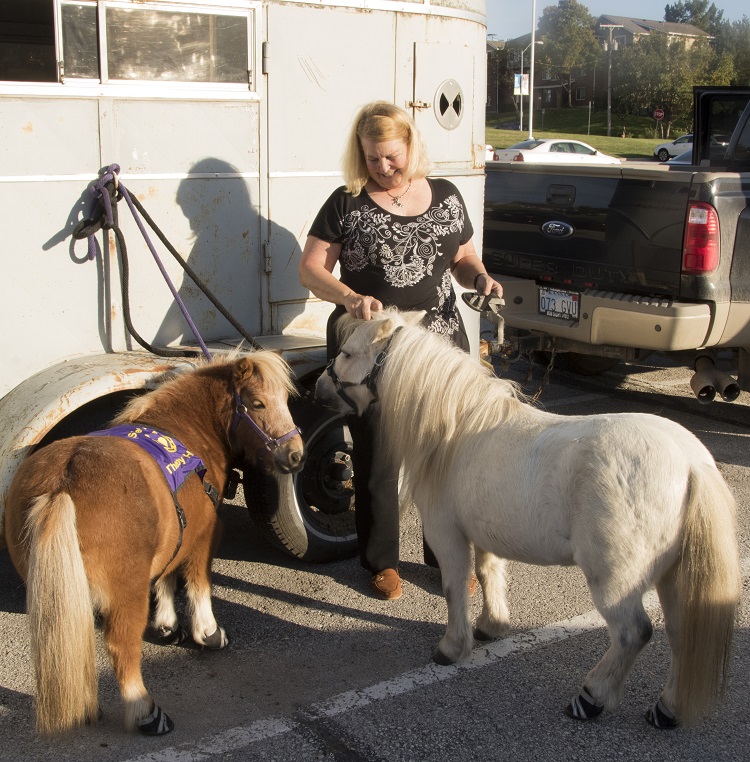Betting on a horse at the racetrack is a good way to lose your money. But betting on horses to help people heal turned out to be a sure thing for Sharon White-Lewis, earning her a Ph.D. and making her a unique mentor and leading researcher in the field of equine therapy.
Horses have been used for therapy since at least the second century, but research documenting their therapeutic benefits is a relatively recent development, said White-Lewis, an assistant professor in the UMKC School of Nursing and Health Studies. Her review of equine-therapy research was published in 2017, and she found benefits for all sorts of patients, from veterans with PTSD and women recovering from breast cancer to cerebral palsy patients who regained nerve function and muscle strength through horseback riding.
“The physical and psychological effects are huge,” said White-Lewis. “Some people walk who have never walked before. Autistic kids talk who never talked before. Horseback riding stimulates all five senses. It’s fascinating what it can do.”
Her own doctoral research at UMKC found that a regular riding program for adults with arthritis decreased their pain, increased their range of motion and improved their quality of life in just six weeks. She’s currently following up with research involving the biomarkers — molecules in the bloodstream —that indicate cartilage and muscle damage, to track how much they decrease with equine therapy as a way to measure its effectiveness.
Besides earning her doctorate, White-Lewis joined the UMKC faculty, and now she wants prospective nursing graduate students to know that they, too, can do equine-therapy research at UMKC, with most of their costs covered. She particularly likes the Nurse Faculty Loan Program, which forgives 85% of advanced-degree students’ loans in return for serving as nursing faculty or hospital preceptors.
“Some people walk who have never walked before. Autistic kids talk who never talked before. Horseback riding stimulates all five senses. It’s fascinating what it can do.”
As White-Lewis sees it, “It can take five years to earn your doctorate, so why not spend that time working with horses and having most of your expenses covered?” She has identified more than two dozen medical uses for horses, so there are plenty of types of therapy to research. And as more high-level research is conducted to document the benefits, she said, equine therapy could gain insurance coverage and benefit more people.
White-Lewis currently has one student doing doctoral equine-therapy research, Holly Bowron Hainley of San Diego. She’s a certified nurse practitioner and has a non-profit organization in Southern California that promotes the psychological benefits of equine therapy by bringing miniature horses to schools and clinics.
Like White-Lewis, she’s hoping equine therapy can spread through greater awareness and more evidence leading to insurance reimbursement.
Bowron Hainley, whose research involves people with eating disorders, said, “Our goal is to have the kind of data you could show a health system saying that if you would reimburse, say, $10,000 for a person to be part of this equine-assisted intervention program, it would save you $30,000 you would have to spend otherwise on psychotherapy, medication, and hospitalization for relapses.
“I can’t tell you how many people tell me my work is the first time they’ve ever actually seen a horse in person. And I’m in California where it’s much easier to have horses than in many parts of the country. Wouldn’t it be wonderful if this therapy was more widely available and affordable?”
Bowron Hainley also hopes others interested in equine therapy research will find White-Lewis. Though such research can be done under a variety of disciplines, from psychology and psychiatry to physical, speech and rehabilitation therapy, such research at nursing schools is rare.
“I did some deep searches, and she appears to be the only nursing faculty in the country mentoring equine therapy research,” Bowron Hainley said. “When I read her dissertation, I said, ‘This is what I want to do.’ ”
“Wouldn’t it be wonderful if this therapy was more widely available and affordable?”
White-Lewis hopes for more doctoral students and pointed out that the research could be done in and around Kansas City, or elsewhere as Bowron Hainley is doing. “My husband and I own four horses and two miniature horses,” said White-Lewis, who also noted that there are several good stables and riding programs around the area.
Her work also has drawn international attention. Her published analysis of equine-assisted therapy helped clarify terms in the field, and her dissertation led to a consortium of researchers in Spain, the United States and six other countries planning to perform extensive further research like hers on equine therapy for arthritis.
For all she has done in equine therapy research, White-Lewis is no one-trick pony at the School of Nursing and Health Studies. She also leads the school’s emergency response studies and teaches quantitative research and disaster preparedness for nurses. As an expert in emergency response, she has helped with local efforts to combat the spread of the coronavirus, and she will help teach a COVID-19 course the school is adding this fall.
But it’s also clear that horses, and equine therapy, have a special place in her heart.
“It’s gratifying that physicians, occupational therapists and other professionals in other countries are working on this,” White-Lewis said. “But I want to see more equine therapy research at UMKC. Its benefits are fascinating, from physical improvements to psychosocial and mental health. We just need more nurse researchers willing to look into the applications and gain evidence to support it.”

